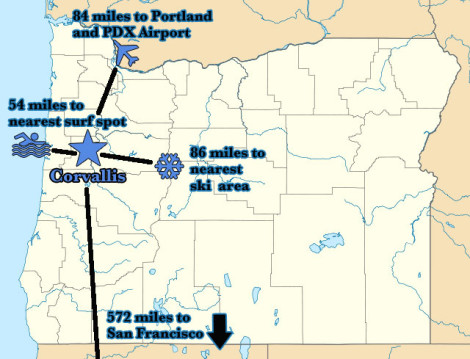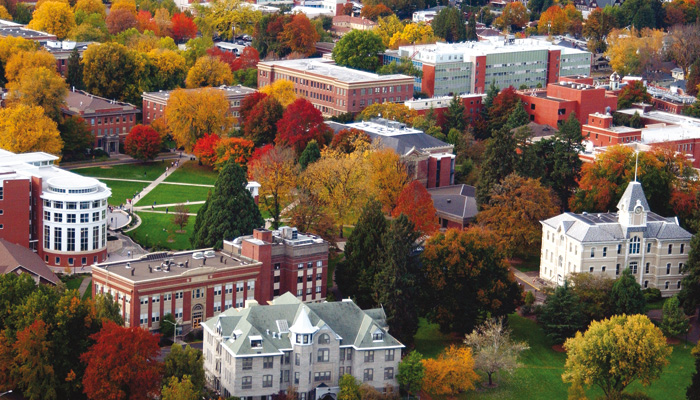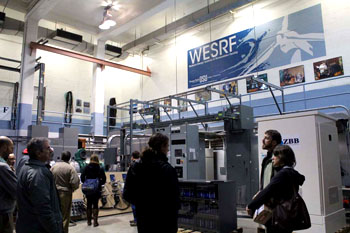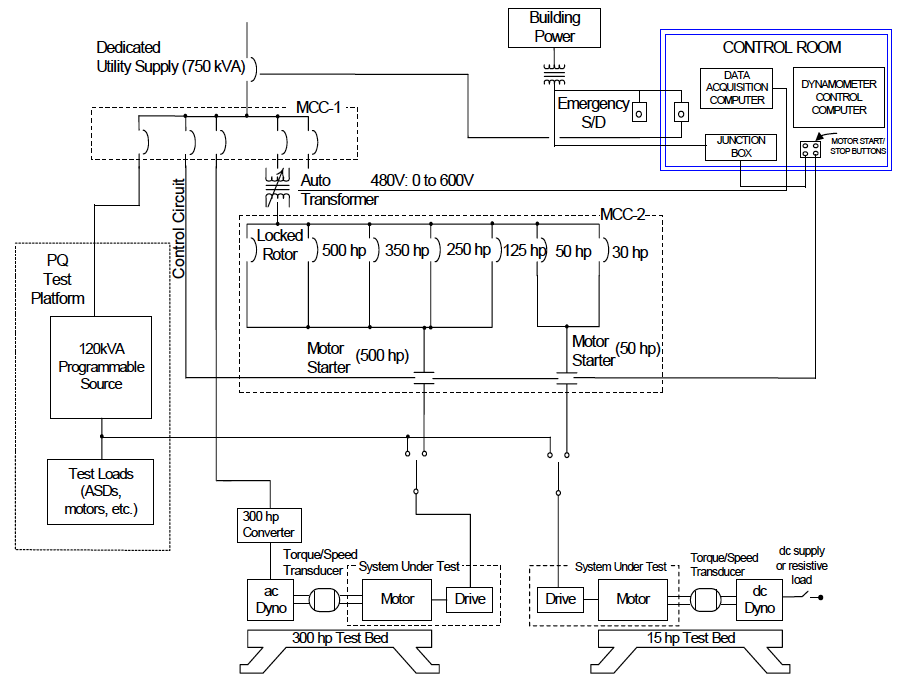Why OSU/Corvallis is Attractive
Some
pictures to start with (people in China please use
VPN):
Corvallis: click here;
Oregon Coast: click here;
Portland: click here;
Bend: click here
I gave
lots of thoughts on OSU and Corvallis before I decided to
choose here as my permanent faculty career home. It was not
initially obvious to me this place was the best for me and my
research group to land in, but over the course of the last few
years during which I researched a lot about the place and
experienced in person at different seasons, I have accumulated
faith in OSU/Corvallis to be the best place to grow in and
become strongly dedicated myself to our group's future here. I
hope some of my observations, while as objective as possible,
help you understand the values here.
 Where is Corvallis
Where is CorvallisAbout
the strategic location
When I
chose among different graduate schools as a student, I did not
emphasize enough on the location factor, but that is something
I wish I knew more back then (especially lacking such
information as an international student). After all, you will
spend 4-5 years (if Ph.D.) at a location that will shape your
career path and life style. On the professional development
side, I think OSU and Oregon have key advantages to help us
develop a strong power electronics and energy systems research
program (especially high power) in the Pacific Northwest US
and the entire West Coast. Industry in renewable energy,
electric vehicles, more electric aircraft, data centers, along
with emerging integrated technology in autonomy, big data,
machine learning, and cyber security, has boomed much in
California, Oregon, and Washington. Yet higher education
programs in high power electronics and energy
systems have not caught up the race on the West Coast. Fact:
upon graduation, most of my graduate school colleagues moved
West from Mid-west and East coast, but isn't it better if
industry can collaborate in research and recruit students
locally (on the West coast)?
 OSU in the fall
OSU in the fall
About
the university and the greater power group
Already the flagship engineering university in Oregon, OSU is also a top institute in the Pacific Northwest and a member of the renowned PAC12 schools. Given the regional booming industry support, nearby national labs and government agencies, as well as liberal policies in energy fields, our research group has no reason not growing strong and nurturing next generation talents. Within the greater Energy Systems Group in EECS, current and former Profs. Brekken, Cotilla-Sanchez, Von Jouanne, J. Zhang have worked hard to create a diverse portfolio of research projects and build up the world famous WESRF energy research center. We are one of the three US universities owning large scale power experimental facilities that operate at 100's kW levels. A wide range of courses offered in power electronics, power systems, machines and drives, EV, and smart grids, etc. ensure to solidify your fundamental knowledge. OSU Electrical Engineering USnews ranking is about #50-55 nationally (this ranking is through a paid subscription list that's not free to public). For a "power" program ranking, we estimate OSU at top 15 nationally and top 3 on the west coast. Perhaps a more research-relevant ranking is by National Science Foundation's (NSF) annual research funding awards (https://dellweb.bfa.nsf.gov/Top50Inst2/default.asp), which directly measures a university's research activities and quality. OSU has been steadily ranked among the top 10 over the years, and oftentimes beats the big named schools.

 WESRF
WESRFAbout
the state of Oregon
Oregon
has been among top 3 and sometimes the top
move-in state (by CNN)
since last few years, and there must be compelling reasons
behind. I can think of the following: job growth, weather,
cost of living, and safety. Already mentioned above, the
high-tech jobs are moving west, but with the high cost of
living in California, many jobs are shifting to pacific
northwest (and Seattle is already getting very expensive),
leaving greater Portland and Willamette Valley very attractive
in this regard. An
extra attractive point to students is the zero sales tax,
helping you to lower living expenses by 8-10%. With
distinct 4 seasons, Oregon is beautiful year round, cool in
the summer while mild in the winter. And, there are leaf color
changes in the fall and once or twice snow each year, although
you will see green almost all year round. Yes I admit the
winter rain part (hey skiers/snowboarders this means powder
days in the mountain!), but there are never hurricanes,
tornadoes, huge thunderstorms or snow storms, extreme cold or
hot weather - basically, Oregon has fewest
natural disasters (by New York Times), and the low home
insurance speaks of this. What about earthquakes? Possible,
but Corvallis sits at the least
impact zone (by USGS) on the west coast.
About
the city of Corvallis
Let's not forget talking about our town Corvallis. The name is Greek meaning "core of valley" or "heart of valley". The city founders were smart because Corvallis is probably among the few spots in the Willamette Valley that are close to both mountains and the Willamette River. On top of that, the coast is 1 hour going west, Eugene is 1 hour going south, Cascades mountain (hiking/skiing) is 2 hours going east, and Portland is 1.5 hours going north. No doubt the natural beauty, easy city access, and minimal crime rates set the peace of mind (see Farmers Insurance safety ranking). The cultural richness of Corvallis is also hard to beat. In this college town, the diverse student body creates endless opportunities to explore your passion, whether it is sports, arts, or professional interests. The diversity has resulted an increasing amount of ethnic restaurants, groceries, and fun activities, especially in the recent years. Although always rated as a top college town (by Forbes), Corvallis is actually considered as a suburb in my view. A usually clean drive of 1 hour to Eugene and 1.5 hours to Portland is not that longer than Naperville to Chicago or Everett to Seattle (with traffic), for example. The daily 10-15 min local commute easily offsets for a weekend trip to Portland or saves up time for you to explore interests.
Two
short campus videos
left:
winter snow 1-2 times a year but beautiful, right: spring
flowers from March to June nonstop